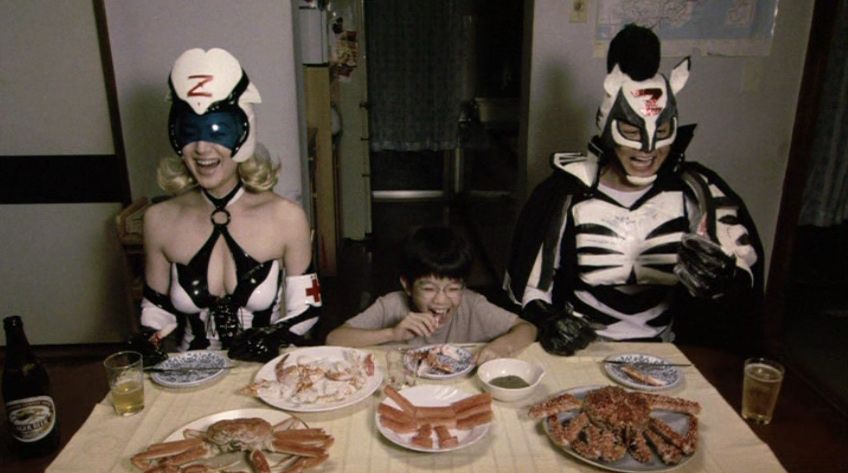« Coffee Break | Main | Kahaani »
June 11, 2013
Re-Agitator

Izo
Re-Agitator: A Decade of Writing on Takashi Miike
Tom Mes - 2013
FAB Press
It is an auspicious coincidence that the updated version of the original book coincided with Takashi Miike's having his first film in competition at Cannes, as well as the recent announcement that he would be making his first Hollywood production, The Outsider, produced by Joel Silver, and to star Tom Hardy. Especially as Miike remains highly productive with at least two films a year, some of us may never see anything close to a definitive film by film examination of his work. What Tom Mes has offered is a collection of notes, some which have appeared accompanying the English language DVD releases of Miike's films.
Where the book is most valuable is in helping put a context to Miike's career. Mes discusses some of the best known films, but also those films that are less discussed, as well as the earliest work, films made for Japan's video market that might never be seen by more than the original audience. Also important is positioning Miike within Japan's film industry. Japan is mirroring Hollywood, so it would make sense that some of Miike's most recent films include big budget remakes like 13 Assassins, as well as helming a crime thriller, Shield of Straw for Warner Brothers' Japanese studio. Mes covers the era of the direct to video film, where younger directors had their first opportunities to prove themselves. One such film was Gozu, a film so idiosyncratic that the producers had no intention of having the film be seen outside of Japan, yet it was also Miike's entry to Cannes ten years ago.

The Great Yokai War
One of my favorite chapters is on Imprint, Miike's contribution to the Showtime cable anthology, "Masters of Horror". Like others, I had great anticipation for what would have been one of the more intriguing films in that series, although I sensed that Miike would up the ante for depicting horror in this series. My feelings were confirmed when Showtime chose not to screen Imprint, and when I finally saw the DVD version. Mes tells a story about Showtime and producer Mick Garris being uncertain as to whether Miike would make his film on time and within the allocated budget. Whether one likes or loathes Imprint, the story of the production illustrates the old adage, "Be careful what you wish for . . ".
The people most likely to snap of this book are probably confirmed Miike fans. Those who really need to read this are those critics and film journalists who kept insisting that the forthcoming The Outsider is Miike's English language debut, forgetting about Sukiyaki Western Django from 2007. One of the couple of times that I've been able to see a Miike film theatrically was when Happiness of the Katakuris played in Denver. Nothing could make me more enthusiastic than reading the review of the Denver Post's clueless second string film critic, Michael Booth, who began, "There are so many moments in Happiness of the Katakuris that beg us to walk out on the movie . . .".
Just a couple of small quibbles - Films cashing in on the popularity of musicians has long been a staple of international cinema prior to A Hard Day's Night. The difference is that Richard Lester's film was a significantly greater critical and commercial success than anticipated at the time of filming. Had I not read the chapter on Andromedia, I would have never known that the four young women were members of the quartet called Speed. That the four young men are members of a group, Da Pump, is made clearer with an incongruous hip hop number in the middle of that film.
Miike translator and actor Christian Storm is helpful in his introduction, discussing Miike's working methods on the set, and explaining how certain humorous moments are Miike's way of paying tribute to Shohei Imamura, for whom Miike served as an Assistant Director. Storm explains that similar scenes were Imamura's tribute to the director he served under, Yuzo Kawashima. Surprisingly, Storm doesn't mention how Miike's connection with Imamura has continued with three films, with screenplays by Imamura's son, Daisuke Tengan. Those three films, by the way, are Audition, Imprint, and 13 Assassins.
This is a generously, and beautifully illustrated book, filled with both film stills and original photographs. The filmography lists Miike's features as well as television work, and direct to video films through 2012. Even with the inconsistent availability of Miike's films for an English language audience, this is still a book worth adding to the library.

Zebraman
Posted by Peter Nellhaus at June 11, 2013 07:28 AM
